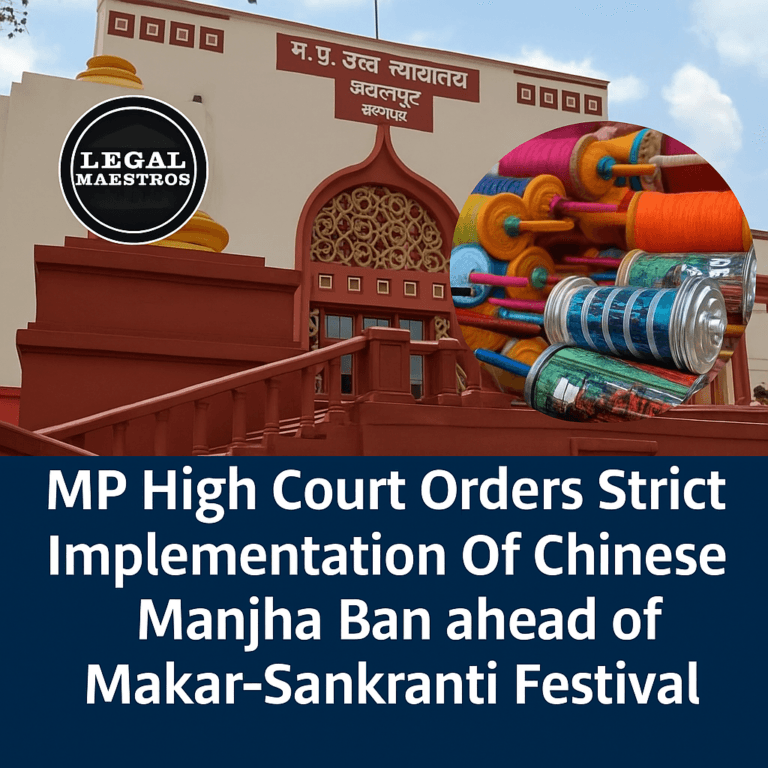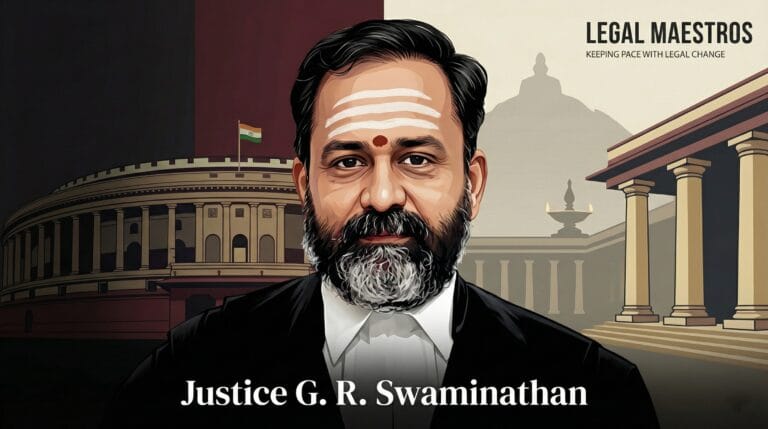
Centre Notifies Justice Sanjeev Prakash Sharma as Acting CJ of Rajasthan High Court
A New Chapter for Rajasthan Judiciary
This is an important development because the current Chief Justice, Augustine George Masih will retire to give way to the new Chief Justice. The selection guarantees a smooth change in the leadership at the apex of the judicial system of the state, which would avoid an administrative vacuum. The notification was made by the Ministry of law and Justice within the provisions of constitutional modalities of appointments made so.
Justice Sharma, the senior-most judge in the Rajasthan High Court, was given the acting position based on a long-held tradition in the Indian judiciary. This tradition is necessary because the leadership of the court is transmitted to an aged hand who is well accustomed to its operations, its trials and tribulations and the administrative requirements. This appointment has been foreseen in the legal community and he will guide the High Court until a permanent Chief Justice through the collegium system.
This shift is significant to the judiciary in Rajasthan. The Chief Justice is a key figure, not only to hear significant cases but also to control the administrative processes of the whole state judiciary system, and the courts that are under it. Although his term is only temporary, Justice Sharma will play a vital role in not only continuing with the momentum of judicial activity and administrative reforms in the state. The direction of the court in future months will be based on his leadership.
For any queries or to publish an article or post or advertisement on our platform, do call at +91 6377460764 or email us at contact@legalmaestros.com.
His leadership will be sought by the legal fraternity in Rajasthan to offer directions on urgent matters, such as how to deal with case backlogs and improve the judicial infrastructure. The enormous experience that he is a judge in the High Court grants him the needed knowledge to effectively cope with these duties. Acting Chief Justice is a challenging and pivotal position towards the continuity of justice to state citizens.
The Journey of Justice Sanjeev Prakash Sharma
Justice Sanjeev Prakash Sharma is a long serving and illustrious lawyer of the state of Rajasthan and has had a long career in the justice system. He graduated at the University of Rajasthan, Jaipur and obtained his Bachelor of Laws (LL.B.) after which he started his professional path. In the year 1987, he registered as an advocate at the Bar Council of Rajasthan and his legal practice lasted more than 20 years and spanned a broad range of legal specialties, earning him a reputation as a well-learned and competent lawyer.
Throughout his decades as a trial lawyer, Justice Sharma tried cases in many areas, such as constitutional, civil, criminal, and service cases. He has practiced litigation before the High Court of Rajasthan extensively, which made him have an in-depth knowledge of the complexities of the litigation process and the intricacies of the court procedures. This broad based experience in the bar equipped him well in the roles he was to play later in the judiciary.
He was a well-known and skilled lawyer and this earned him an appointment to the Rajasthan High Court on November 16, 2016. Since then, he has officiated many cases and made various historic judgments that have shaped the jurisprudence of the state in many ways. His judicial statements have been characterized by clarity, legal reasoning and adherence to principles of fairness and equity.
Justice Sharma has over the years commanded respect because of his judicial temperament, his patient listening to arguments and his stern but just manner in a courtroom. His rise to the top of the judicial system in the state, starting as a young law graduate in Jaipur, proves how he worked hard and has been committed to the rule of law. He will bring this experience into his leadership as the Acting Chief Justice.
Understanding the Role of an Acting Chief Justice
The selection of an Acting Chief Justice is a special clause within the constitution that is meant to ensure that the High Courts are not brought to a stand-still. This position is established by the constitution of India, Article 223, giving the President of India the power to appoint a judge of the High Court to serve the functions of the Chief Justice in case of absence or any other reason the Chief Justice is unable to discharge his or her duties.
An Acting Chief Justice has the same powers and duties of a permanent Chief Justice. These responsibilities are two-fold, that is, they involve judicial and administrative functions. At the court level, they are the presiding officers in a bench and listen to significant cases. On the administrative front, they occupy the post of head of state judiciary, which is in charge of day to day running of the High Court and also the supervision of the district and subordinate courts in the state.
Among the most important administrative jobs of the Chief Justice is the maintenance of the roster of the court, in which cases are referred to various judges and benches. This is an essential power of the master of the roster, which is essential to the effective work of the court and the punctual case disposition. The collegium of the High Court also has the Acting Chief Justice and is in charge of proposing names to fill new positions of judges.
One should realize that this is a temporary solution. The office of the Acting Chief Justice remains in place until the President appoints a permanent Chief Justice following the recommendation of the Supreme Court Collegium. It may be a lengthy process and in the process, the Acting Chief Justice brings about stability and continuity in the process making important decisions to ensure that the wheels of justice run well.
The Path Ahead for the Rajasthan High Court
The high court in Rajasthan being the highest court of the state has several challenges that will be addressed by the new leadership. The most notable of them is the long pendency of cases. It has a substantial number of cases in its backlog, similar to most other high courts in the country, and methods to be creative and effective in getting them off are a priority. This is not only judicial work but also strong administrative policies to facilitate the work.






